Photographs: Chris Wattie/Reuters
Richard Fontaine, the key man behind the recent report, Natural Allies: A Blueprint for the Future of US-India Relations, explains in a lively interview with Rediff.com's Aziz Haniffa.
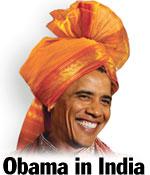
Richard Fontaine, Senior Fellow, Centre for a New American Security, whose mission is to develop strong, pragmatic, and principled national security and defence policies, was the project director for Natural Allies: A Blueprint for the Future of US-India Relations.
The project was co-chaired by two experienced and respected former diplomats, former US deputy secretary of state Richard Armitage and former under secretary of state Nicholas Burns.
Fontaine served as foreign policy advisor to Senator John McCain and his presidential campaign. Following the election, Fontaine served as minority deputy staff director on the Senate Armed Services Committee.
He had earlier served in the National Security Council and in the State Department, both in the South Asia bureau, and as a senior aide to Armitage.
Fontaine began his foreign policy career as a staff member of the Senate Foreign Relations Committee, focusing on the Middle East and South Asia. After the presidential campaign, and days after the November 2008 Mumbai terror attacks, Fontaine accompanied McCain to India.
He met Prime Minister Manmohan Singh and other senior officials, where the bulk of the discussions centered around India-US counter-terrorism cooperation.
During the official rollout of the CNAS report, Armitage and Burns lavished kudos on Fontaine. "This is a very tightly written report," Armitage said, "and with all due respect to those vegetarians in the audience, I would describe it as an all-meat-and-no-potatoes report. And the fellow who started it all is Richard Fontaine."
Richard Fontaine discussed the CNAS report with Rediff.com's Aziz Haniffa.
What exactly promoted the CNAS to undertake this project, which I believe began almost a year ago?
The sense at the time was that India is obviously growing in international importance and a think-tank like ours looks at the grand sweep of US foreign policy and US national security policy, with a particular emphasis on policy recommendations for what the US should do.
So, we look at this through a US interests perspective. And, some of the other think-tanks have one person or a couple of people doing India-specific things, India publications and so forth, but we weren't aware of any think-tank like ours that was doing a really in-depth study of what the future of the US-India relationship should look like.
And that included in the people working on this, not just India and South Asia experts, but foreign policy generalists, that need to look at this relationship in the overall context of everything that we are trying to do in the world -- whether it's China, Iran, Afghanistan, Pakistan, everything. That's sort of how we decided on it.
An expanded UN Security Council minus India: Illogical!
Image: The United Nations Security Council meetsPhotographs: Jessica Rinaldi/Reuters

This was one of the things we talked about at great depth. The sense that everyone was left with is, if we are going to enlarge the Security Council at some point and that enlargement is not going to include India, then we are talking about just an illogical and anachronistic enlargement of the Security Council.
Today, the Security Council does not reflect the power balance -- and that's quite obvious.
But if we were to enlarge the Security Council and add new members and did not include India, it would only further undermine the credibility of the Security Council. Because again, it would even less reflect the power balance and the power distribution in the world today.
So, not only for the credibility of any enlargement of the Security Council but also in recognition of India's emergence as a great power, those were sort of the two things that came together for most people in the group.
Was there a consensus that this should be the one big-ticket item that President Barack Obama should carry forth during his trip to India
One thing worth noting about this report is that this is not a laundry list of activities that we think the President should absolutely put on the table for his trip.
What we tried to do is have a mix of things that both sides could do immediately and things that are of vision that may take five or 10 years. So, the Security Council stuff, that could happen tomorrow.
The United States can do that tomorrow in terms of its position, but some of the other stuff on promoting democracy and human rights -- that's a longer effort to get even to the point where both sides are comfortable dealing with each other on those issues. And, that's further out.
So, when it comes to the Security Council, the report says it's something we believe the United States should do immediately.
What it doesn't say is that we believe the President has to do a, b, c, d, and e. It's a blueprint that's going to be more enduring beyond the first week of November.
'As China grows in influence, a stronger India is needed to maintain balance'
Image: It is hard to have a strategic partnership with ISRO on the Entities List, says FontainePhotographs: http://www.isro.org/

Yes, there was consensus on that because there is frustration from American policymakers across the board with the current state of the US Export Control system and that's why the White House and the Department of Defence has launched this review where they are going to apparently have some recommendations of how to reform this.
This is not India specific, but the view that came out of the working group by a lot of the members of the group was that if we are going to talk about a strategic partnership with India, then that implies actions on the part of the United States and actions on the part of India as well, particularly in terms of harmonising our respective export control regulations.
I guess in particular having ISRO on the Entity List is utterly anachronistic, especially when there is all this talk about cooperation in the Global Commons, etc?
Yes, we have policymakers who have described India as a major 21st century partner in outer space.
By the same token, the Indian version of NASA (the National Aeronautics and Space Administration) is on the Entities List. It's sort of hard to square a strategic partnership in space with keeping ISRO on the Entities List.
And so, it was the view of the working group that ISRO should be taken off the Entities List and we should see space as a major potential area of cooperation for US and India.
There was an interesting twist to the kind of neo-con strategy of bolstering India as a counterweight to China by boosting India militarily, which both the US and India have dismissed.
But you have been careful in your report in not talking about any strategic containment but a sort of containment via the promotion of democracy in the region so that it could be a peaceful buffer of sorts vis-a-vis Beijing.
One of the issues that you have to grapple with when you talk about Asia is the rise of China, and the consensus in the working group was we say neither the US nor India seeks the containment of China.
But we also want to see a balance of power be preserved in Asia and as China grows in influence, a stronger India and a stronger India working together with an America that has a presence in Asia is to the good in maintaining that balance.
'The nuclear liability issue needs to be resolved soon'
Image: US Marines in southern Afghanistan's Helmand provincePhotographs: Finbarr O'Reilly/Reuters
What do you want India to do to address this situation, which you warn if not fixed soon could jeopardise the deal?
Do you want this Indian legislation amended?

We are aware of some of the things that have appeared in the newspapers and so forth -- various potential solutions that have cropped up. We have not taken a position on any of those and whether one is the way to go or how sufficient those would be, and I have seen everything from amending the law -- which I understand is probably pretty unlikely -- to some sort of written agreement to just various forms of ameliorating this.
My understanding is that the Indian position and the position of the Indian lawmakers is not currently the same of the lawyers on the US side or on the private sector side. So, they have to hammer out exactly what the understandings are on both sides.
So, we haven't taken a position to say, this is what India should do.
But what we do say that this has become a cornerstone of this new partnership and for this to not come to full fruition really undermines so much of the work that has been done for the last few years to bring this partnership together.
MSo, basically we leave it as saying we believe that this issue of legal liability needs to be resolved soon.
While acknowledging that US-India discussions about China have expanded significantly, the report bemoans that discussion of Pakistan and Afghanistan remain inadequate. Where are these inadequacies?
When it comes to Pakistan, there are many occasions where US officials and Indian officials exchange their views in more general and generic terms.
But what we believe is that this needs to go one step deeper and talk about not just questions of the day, which of course, are important, but also how the US and India each see Pakistan going in the future and what that implies for this new partnership that we have, which is premised on joint activities in a lot of different ways.
So, basically, it's a recommendation that we have more transparency on both sides on what the other's understanding is about what's happening in Pakistan -- our own policies toward Pakistan.
It is not a case of let's develop this list of particular specific activities with respect to Pakistan, but it's just calling for more dialogue on that front.
On Afghanistan, this is something that we believe is pretty ripe for discussions because India has got ties to (Afghan President Hamid) Karzai and to a lot of the folks in the Afghan government. It's got Indian contractors on the ground, it's constructing the Afghan parliament, it's got historic ties with the country.
And so, at a time when the US is looking for ways that we can improve the situation and do so quickly, we believe it's worth having a deeper conversation with India about what both of us might do.
Now that would, of course, have to take into account the obvious Pakistani sensibilities and sensitivities about the perception of the Indian presence in Afghanistan.
So, it's going to be a little tricky, but it's a discussion that should become deeper and more frequent than it has been thus far.
'Iran has the potential to be a hindrance to deepening India-US ties'
Image: An anti-India protest in SrinagarPhotographs: Danish Ismail/Reuters
But there is not a single mention of the K-word in the report. Was that deliberate?

Not entirely. We have discussions here and there but I think in some ways that some of these issues like Kashmir and Pakistan as well -- you see the word Pakistan only appear twice or something -- is that one thing that we were conscious of is not spending lots of ink on some of the most controversial aspects of what's happening in the region and inside India right now.
We could have had a long discussion in the blueprint of Kashmir and of Pakistan and of Iran. But then most of the discussion that we have on all these other items would have been lost as the attention gravitated towards those items.
Like I said, what we are trying to do here is lay out a series of a framework for thinking about the US-India relationship and a series of potential action items that stretch from tomorrow to 10 years out and in order to keep the focus on those things.
On Iran, the recommendation is that India and the US should cooperate more effectively in the global effort to end Tehran's pursuit of nuclear weapons.
India always points out that it has voted with the international community at the International Atomic Energy Agency against Iran's alleged nuclear programme but also says it has a problem with sanctions against Iran.
Is this a hiccup that you foresee in the evolving, long-term US-India strategic relationship?
I can't speak for the working group on that question -- because we did discuss it, but we didn't try to push it to consensus. Again, we were trying not to spend all of our time focused on the regional issues, but rather the kinds of things US and India can do bilaterally in the multilateral framework.
But, personally speaking, this has the potential to be a hindrance to the deepening of the relationship and yes, India has voted against the IAEA against Iran, but like you said, it has also taken a position that more sanctions are not the way to go.
Now that India is about to begin its two years' non-permanent membership on the UN Security Council, my assumption is that at some point during those two years, there will be a question of Iran that comes before the Security Council.
And that's going to have the potential to make things a little testier than they would otherwise be between the United States and India, because both sides are going to have to choose where they come down on that question.
So, it's an issue to manage, but it's got the potential to be a hiccup.
I know the working group met with Under Secretary of State Bill Burns. And of course, the co-founders of the CNAS are Kurt Campbell and Michelle Flournoy -- two of the most senior policymakers in the Obama administration for East Asia and defence and military policy respectively -- who both visited India recently.
What has been the response of the administration to the blueprint and where do you go from here?
We provided the administration with advance copies last week and given everything on their plate, I guess they are still mulling over some of this. That said, we did have long discussions with Burns about the different elements that we were going to be putting in here. So, they had a very good sense on where we were headed in this blueprint.
I can't speak for the administration about what they think of it or where they come down on it, but I can tell you that we have very extensive discussions with personally I've talked to folks at Commerce, NSC (National Security Council), USTR (US Trade Representative), OSD (Office of the Secretary of Defence), PACCOM (Pacific Command), the State Department. So, we have very extensive discussions all along those lines.
In terms of where this goes from here, our first audience is on the American side and besides providing advance copies, we will continue to brief this beyond its rollout to folks on Capitol Hill, who have also been provided with advance copies. So, the American audience here is important, particularly in the run-up to the President's trip, but there also is an important Indian audience as well.
Our hope is that this would ideally generate a similar effort on the Indian front, where a group of Indian experts got together to look at the future of the US-India relationship.
It will be very interesting to see how close or how far apart these two efforts would be.

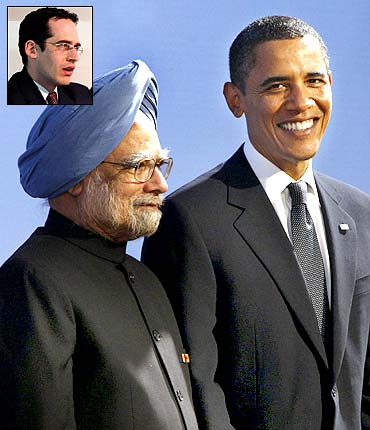
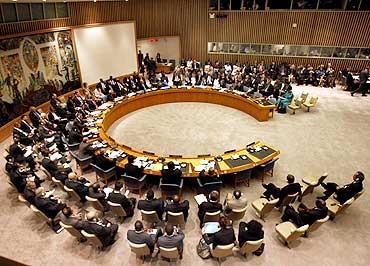
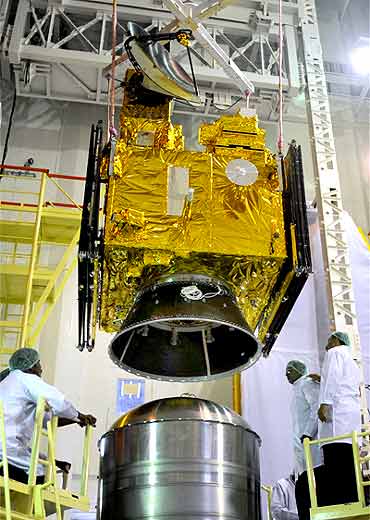
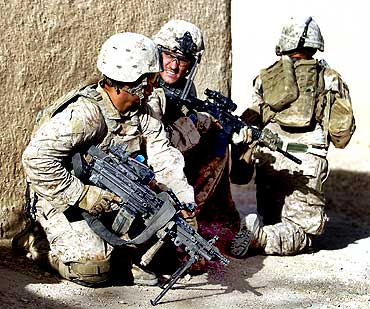
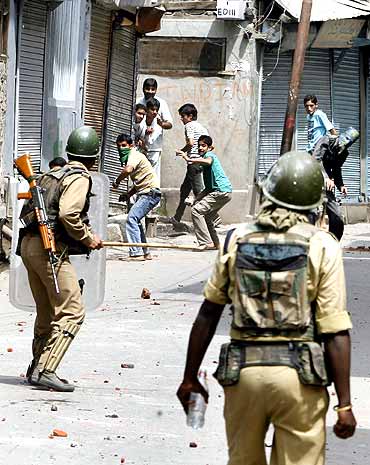
article